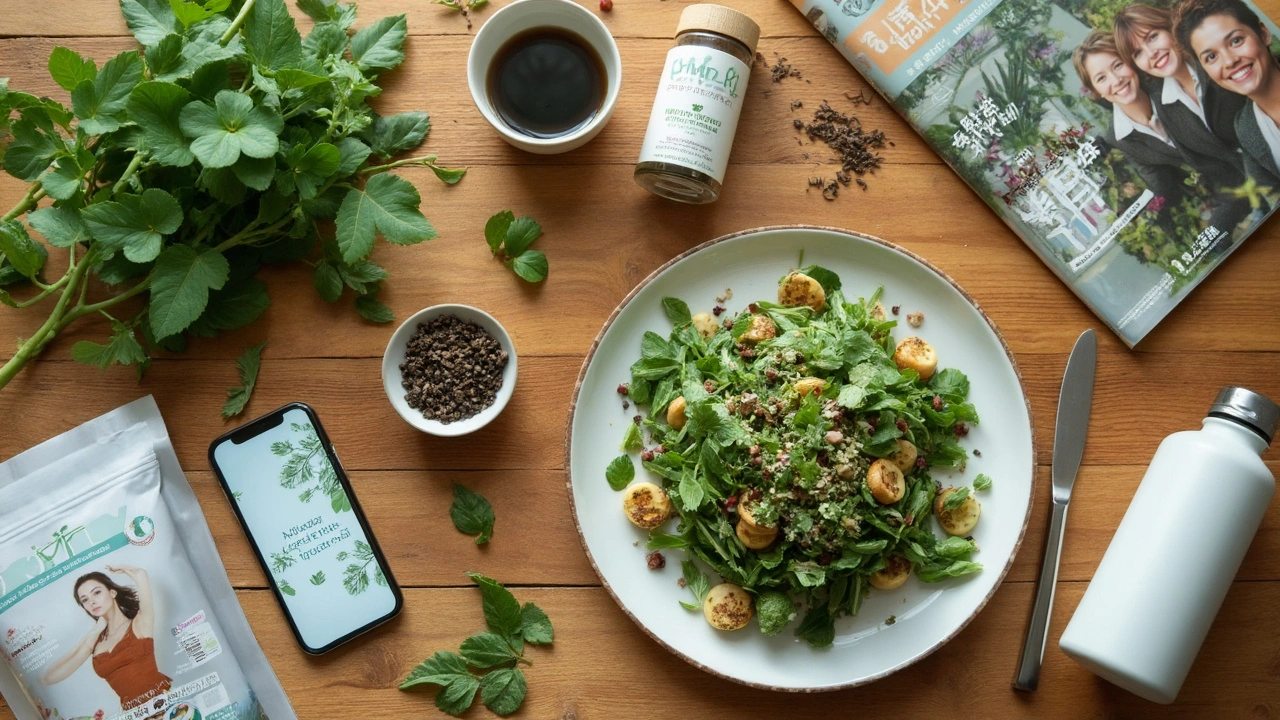Chinese Mallow Supplement Benefits: Natural Health Secret Revealed

Ever wondered why some people look and feel so much healthier, even when they're not following any wild diets or spending fortunes on fancy wellness trends? Sometimes the answer is hiding in plain sight. Chinese Mallow, a leafy plant from the corners of ancient tea gardens, has been quietly transforming people’s health for centuries—long before it started popping up in trendy supplement aisles. The truth is, this humble herb could easily outshine half the pills cluttering your kitchen shelf.
What Exactly Is Chinese Mallow and Why Is It Catching So Much Hype?
Let’s be honest—when you hear “mallow,” your brain might jump to marshmallows. But Chinese Mallow (Malva verticillata), is nowhere near those sugary treats. It’s a wild green, with soft, round leaves, native to East Asia. In China, people have brewed it into teas, cooked it in soups, and even used it as medicine for thousands of years. You won’t find it glammed up in expensive bottles—yet, what it delivers puts many big-brand “superfoods” to shame. The plant is packed with vitamins A and C, calcium, magnesium, and rich plant fiber. Local folk medicine swears by it for soothing the digestive tract, clearing out body heat (think: internal “cooling” when things get a little too inflamed), and even calming coughs and sore throats. If you dig through ancient texts—like the Compendium of Materia Medica written in the 16th century—you’ll spot Chinese Mallow time and again as a trusted go-to. The plant’s leaves and seeds both have their uses, but the leaves are where the most prized benefits hide. Not many realize just how widespread its use is in China, Korea, and Japan. In rural China today, you’ll still see families sipping tea made from the dried leaves to help digestion after big meals. As the supplement and wellness world keeps searching for the “next big thing,” this common backyard plant keeps quietly winning loyal fans.
If you want the real science, check out a 2022 study published in the Journal of Ethnopharmacology: researchers confirmed the leaves had compounds that help fight oxidative stress—basically, keeping your cells from corroding thanks to free radicals. Another piece of research, from 2021, found that Malva verticillata extracts helped mice deal with digestive inflammation and sped up their gut’s ability to recover from irritation. Not bad for something that looks like roadside salad greens, right?
So why’s it becoming popular beyond its home turf? Simplicity. It’s affordable, gentle, and doesn’t need fancy processing. You can brew the leaves like tea (hot or cold), sprinkle dried flakes onto your rice bowl, or find it ground up in supplement capsules. It’s not fussy. A lot of modern supplements are pumped full of additives, but with Chinese Mallow, what you see is what you get. If pure and natural is your vibe, this plant is worth a look.

How Chinese Mallow Can Transform Your Gut, Immunity, and Everyday Wellness
Scroll through wellness forums or talk to herbalists in Beijing, and you’ll hear a common story: Chinese Mallow does wonders for your gut. It’s all about the fiber—more than most supermarket veggies, mallow leaves bring you soluble fiber that acts a bit like a sponge, sweeping your digestive tract clean and gently helping you “get regular” without unpleasant side effects. This fiber also feeds the good bacteria in your gut, supporting your microbiome in ways not many supplements can manage naturally.
There’s a reason families in rural Asia still drink a mug of mallow tea after heavy, oily meals. It calms the stomach, takes pressure off your liver, and helps you bounce back from that food-coma feeling. Studies out of Nanjing University found the plant’s polysaccharides supported the repair of stomach lining after stress and even helped balance acidity. And if you’re someone who battles bouts of constipation or bloating, users report that within two weeks of regular use (tea or capsules), they noticed smoother digestion, less swelling, and a lot less awkward gurgling in the middle of meetings.
But Chinese Mallow isn’t just about ‘bathroom benefits.’ Its calming compounds (especially a flavonoid called malvone) help cool inflammation all around your body. Got a scratchy throat or the sniffles? Folks have brewed the leaves as a gargle or a mild decoction for coughs since grandma’s day. Its Vitamin C boost can help rally your immune system, especially when cold season rolls around. One cup of concentrated mallow tea has about as much immune-friendly power as a glass of orange juice but without the sugar hit. You also get a natural helping of calcium and magnesium—perfect for people who don’t do dairy but still want strong bones and a calm, steady mood.
If you track your daily nutrients, here’s a quick snapshot of what you’re getting from a standard serving of mallow tea (about 2 grams of dried leaves):
| Nutrient | Per 2g Dried Leaves |
|---|---|
| Fiber | 1.4 g |
| Vitamin C | 9 mg |
| Calcium | 18 mg |
| Magnesium | 8 mg |
| Antioxidants | High |
Nothing wild, but it adds up if you’re consistent. Now, the magic is in the regular use. Unlike a caffeine hit or a “miracle” detox tea, you won’t feel it work overnight. Most people notice gentle improvements in digestion, immunity, and even skin clarity after a few weeks of regular use. So, if you’re ready to ditch bloating, nagging colds, or uneasy tummies, Chinese Mallow could easily be your new best friend.

Getting It Right: Smart Ways to Add Chinese Mallow to Your Life Today
Here’s the cool part: you don’t need an apothecary or a bunch of rare tools. Most health stores, and even some large online retailers, carry dried mallow leaves, tea bags, and capsules. But don’t just grab the first product you see—like any herb, freshness matters. Dried leaves that still have a strong, almost grassy smell and bright green color are best. Skip any that look gray, dull, or powdery. If you’re a DIY type, you can even grow Chinese Mallow from seeds in a sunny pot at home. It’ll thrive almost anywhere with regular watering, and you get the bonus of knowing exactly what you’re consuming.
The classic way to use it is tea. Pour just-boiled water over a teaspoon of dried leaves, let it steep for five to eight minutes, and sip plain or with a slice of lemon. If you like, toss in a little honey—but honestly, the flavor is smooth and a bit nutty on its own. For those who want easy and fuss-free results, capsules or tablets let you skip the brewing, but make sure you’re buying from a reputable supplier with transparent sourcing.
If you want to get creative, add dried mallow to soups, toss some in your rice cooker when making brown rice, or blend a bit into morning smoothies. Some folks even sprinkle the powder onto salads for a fresh, earthy boost. If you’re dealing with sore throats or colds, try a more concentrated brew and use it to gargle a couple of times a day.
Here are some handy tips for getting the most out of Chinese Mallow:
- Start small—one teaspoon or a single capsule a day is plenty for newcomers. See how your body feels after a week.
- Drink plenty of water, especially if you boost your fiber intake—this helps everything move smoothly.
- Pair with ginger or lemon if your taste buds want something extra.
- Pick organic or wild-harvested leaves when you can. These tend to pack the highest nutrient punch.
- Check with a doctor if you’re on blood thinners or pregnant—mallow is gentle, but it’s smart to stay safe.
- If you grow your own, pick leaves before the plant flowers for the best flavor and nutrition.
What’s really wild is that, unlike a lot of trendy superfoods, Chinese Mallow almost never causes side effects. Unless you go wild and eat a whole salad bowl’s worth in a sitting, you’ll probably only notice the positives—better digestion, fewer seasonal bugs, and maybe even clearer skin after a month or two.
Ready for a game-changer? Adding Chinese Mallow to your daily routine is one of the easiest, most affordable ways to upgrade how you feel and move. It’s the ultimate no-hype plant supplement—modest, natural, backed by culture and real results. Simple is powerful, and sometimes the best secrets are the ones right under our nose (or quietly growing in the corner of the garden).






Comments
Akshay Pure
July 18, 2025 AT 06:39Look, not to sound elitist here but Chinese Mallow is one of those traditional herbs that's often overlooked because it isn't mainstream enough yet. Honestly, if you're serious about wellness, you should expect to dig beyond the typical goji berries and turmeric hype. The research backing Chinese Mallow’s benefits for digestion and immune support is solid if you bother looking at the clinical data instead of just buzzwords.
It’s fascinating how some of these herbs have been cultivated for centuries, yet modern wellness still chases after flashy synthetic options. I’d argue the wisdom in these natural supplements is often underrated. And, no, it’s not just placebo—there are bioactive compounds in Chinese Mallow that do real work in the body.
That said, I’d recommend anyone interested to critically assess the dosage and preparation methods. Not all supplements are created equal, and many on the market might be lacking. But for those who respect the craft, it’s definitely worth keeping on your shelf and incorporating into your regimen.
Steven Macy
July 20, 2025 AT 14:12I appreciate the balanced tone of this post. It’s refreshing to see natural health topics being approached with both enthusiasm and caution. I’ve always believed that embracing traditional knowledge requires thoughtful integration with modern science.
There’s something deeply philosophical about how humans have interacted with plants over millennia. Chinese Mallow’s role in boosting digestion and immunity seems to echo a broader connection between nature and well-being. Still, I often wonder how personal variables impact the efficacy of such herbs. Like, how do genetics, existing health conditions, or diet influence results?
It’d be great if more studies could explore those nuances. Meanwhile, anyone curious about adding this supplement to their diet should definitely think about holistic lifestyle factors, not just isolated consumption. What’s your take on that intersection between tradition and personalized health?
Matt Stone
July 22, 2025 AT 21:45Sounds promising but where’s the proof? We thrive on evidence here. Which studies back these claims? How rigorous were the trials? Because without that, it’s just old folklore being packaged.
Also, digestion and immunity are broad claims. What exactly does it improve? Gut flora? T-cell function? And what about safety? Any side effects reported?
Seems like people should be cautious before blindly jumping into a new supplement based on overhyped buzzwords. Clear specifics please. This post was a bit too vague for my taste.
Jessica Martins
July 24, 2025 AT 01:32Great article! The breakdown of how to add Chinese Mallow to your diet was especially useful. I’ve been curious about trying it but didn’t know where to start.
It’s interesting to see the natural ways this herb can support immunity, particularly in times when many seek alternatives to boost their health naturally. Also, the explanation of digestive benefits makes me want to experiment with adding it to my morning smoothies.
Has anyone here tried making tea or soups with it? How did you find the taste? I’m a bit cautious about strong bitter flavors but willing to try for the benefits described.
Gayatri Potdar
July 27, 2025 AT 12:52Umm, I don't know, folks. I've been digging into these so-called 'natural health secrets' and honestly, it smells like another pharma conspiracy to me. They always hype some ‘ancient herb’ when in reality, the industry just wants to keep us hooked on new products. Watch how this Chinese Mallow will be pushed alongside other herbal supplements but never give real cures.
Plus, no one talks about the shady supply chains or potential contamination with pesticides or worse toxic chemicals. Who audits these products? They want you blindly trusting kitchen cabinet miracles while ignoring real medicine.
Stay woke and don’t be a guinea pig for corporations selling snake oil disguised as wellness.
Marcella Kennedy
July 31, 2025 AT 00:12Thanks for sharing this insightful article! I love how it approaches the topic with honesty and clear guidance. As someone who's been exploring herbal supplements for years, it’s encouraging to see a balanced perspective rather than exaggerated claims.
I think the key with Chinese Mallow, and really with any supplement, is listening to your body and integrating it gradually into a healthy diet. Personal responsiveness varies so much, and feeling empowered with information is crucial.
Also, sharing recipes or ideas for consumption could really help newbies feel more comfortable. Sometimes the preparation method makes all the difference between a supplement being pleasant and actually enjoyable versus just tolerable.
Jamie Hogan
August 3, 2025 AT 11:32The potential biochemical pathways influenced by Chinese Mallow are indeed intriguing. Flavonoid compounds and mucilage present in this herb warrant further exploration for their immunomodulatory and gastroprotective properties. However, it’s vital to stay skeptical about broad-spectrum health claims, especially when pharmacokinetics and active metabolites aren’t fully delineated in human models.
Moreover, the pharmacognosy of traditional herbs often suffers from quality control issues, which can hamper reproducibility in clinical trials. If we are to consider this as a serious supplement, rigorous standardization and validation trials must become an industry norm, not an exception.
Alan Whittaker
August 6, 2025 AT 22:53Honestly, don’t fall for the herbal health hype without a thorough critique of the supply chains and potential corporate manipulation. Chinese Mallow is likely just another cog in the wellness-industrial complex designed to market to naive consumers looking for quick fixes.
Also, consider the geopolitical ramifications—herbal ingredients sourced from regions with lax regulations can lead to ethical and safety compromises. Meanwhile, the media narrative conveniently ignores these dark undercurrents to maintain the allure of ‘natural’ and ‘traditional’ health.
We need to question who profits from these trends and at what cost to public health standards and honest information dissemination.
Kevin Cahuana
August 10, 2025 AT 07:26Appreciate all these varied insights so far. It’s clear that while Chinese Mallow has promise, the conversation needs balanced facts and personal experience anecdotes.
For anyone considering this supplement, I’d recommend consulting healthcare professionals and maybe even tracking your response over a few weeks. Immune and digestive health can be influenced by so many factors that supplements alone aren’t a magic bullet.
It would be great if someone could share trusted sources or studies that clearly detail the active compounds and their clinical effects—helps us all make more informed decisions.
Danielle Ryan
August 13, 2025 AT 18:46Oh, for heaven’s sake, the paranoia about supplement conspiracies is exhausting!!! Sure, be critical, but not everything is a grand sinister plot to poison us. Like, sometimes herbs genuinely do have benefits, and that’s okay!!!
Chinese Mallow might just be one of those gems from nature that’s been unfairly ignored. Instead of endless skepticism, how about we try embracing new things with an open mind and see what happens? Everyone’s so negatively charged these days it’s draining.
Trust me, I’ve been burned before with supplements but dismissing everything outright isn’t the solution either. Balance and a bit of hope go a long way.
Robyn Chowdhury
August 17, 2025 AT 06:05While some skepticism is healthy, the entire obsession with herbal supplements seems rather theatrical. Are we really reaching enlightenment through humble plants, or are we just feeding modern age tribalism with an overdramatic attachment to 'ancient secrets'?
I do appreciate the scientific approach outlined in the article, but it’s funny how quickly these herbs become symbols of holistic salvation before being reduced to mundane supplements. It’s a cycle of hype and disillusionment, really.
Nevertheless, I’m curious whether the benefits claimed for Chinese Mallow hold up under more rigorous study or if it will become another fleeting health fad. Until then, cautious optimism and a good sense of humor remain my best tools. 😊